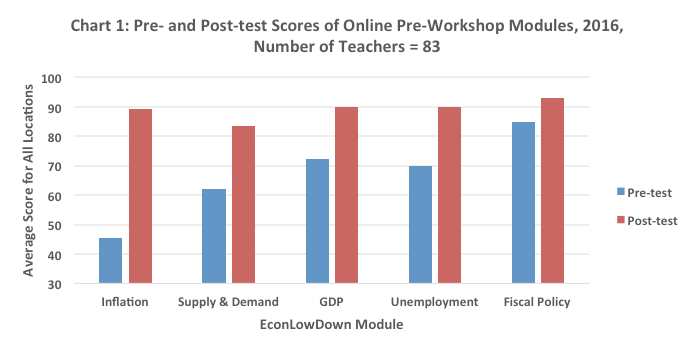Teachers Are Students at Our Workshops
AIER’s Teach-the-Teachers Initiative (TTI) is a multiday program that provides high school teachers in various disciplines with understanding of economic concepts. The novelty of the program is the Economics-Across-the-Curriculum approach, which encourages teachers to incorporate economic concepts into their various fields of study. The program, therefore, appeals not only to economics teachers but to teachers of English language arts, social studies, math, and other subjects. The participants’ diversity generates cross-pollination of ideas, dynamic discussion, and promotes the interdisciplinary approach to teaching.
However, the broad range of subjects taught by teachers attracted to our workshop presents a challenge. The challenge lies in the wide variation among our participants in their understanding of economic concepts. To level the playing field for all participants, we developed a rigorous 13-hour online course for teachers to complete prior to the workshop using the EconLowDown portal of the Federal Reserve Bank of St. Louis. The online activities provided participants with a common understanding of the concepts to be presented during the program. In addition, by completing the online pre-work portion, more face-to-face time during the workshop was used to engage in activities related to pedagogy and implementing the lesson ideas within their classrooms.
Eighty-three teachers went through the program during summer 2016, when we held the workshops in Boston, Chicago, and Philadelphia. Many disciplines were represented, including history (24 teachers), math (7 teachers), financial literacy (5 teachers), technology and computer science (4 teachers), economics (12 teachers), and consumer science (8 teachers). The topics covered in the online modules were inflation, supply and demand, GDP, unemployment, and fiscal policy. Each participant took a pre-test to measure their understanding of the concept prior to studying the module. After completing the online work, each participant took a post-test.
We were impressed with the teachers’ learning. The difference in scores between pre- and post-tests reflect consistent, and sometimes striking, improvement in overall understanding of the economic concepts. These results are shown in chart 1.
As you can see, the inflation topic produced the biggest improvement in teachers’ knowledge, while understanding of fiscal policy improved only slightly, mostly because the starting knowledge of fiscal policy was already high (average pre-test score was 85 percent), while the inflation concept was quite unfamiliar (average pre-test score was 45 percent). The main takeaway is that after the online work, teachers mastered each topic, reaching a score of 90 percent or better.
Armed with this solid knowledge, participants came to the workshop. The workshop therefore was robust with discussions, demonstrations, constructive criticism, and sharing of best practices. Participants focused on finding ways to integrate economic concepts, now clearly understood by the teachers, into the curricula of diverse subjects and grade levels.
Based on the material presented during the workshop, including content, pedagogy, and assessment, each teacher developed a lesson idea to be field-tested in their classroom. If you are curious how students’ knowledge improved after the lesson, stay tuned to read my next blog, where I will present those results. If you want to experience this program in the upcoming summer, please join us in St. Louis, Miami, or Omaha. Registration is open!
Click here to sign up for the Daily Economy weekly digest!









